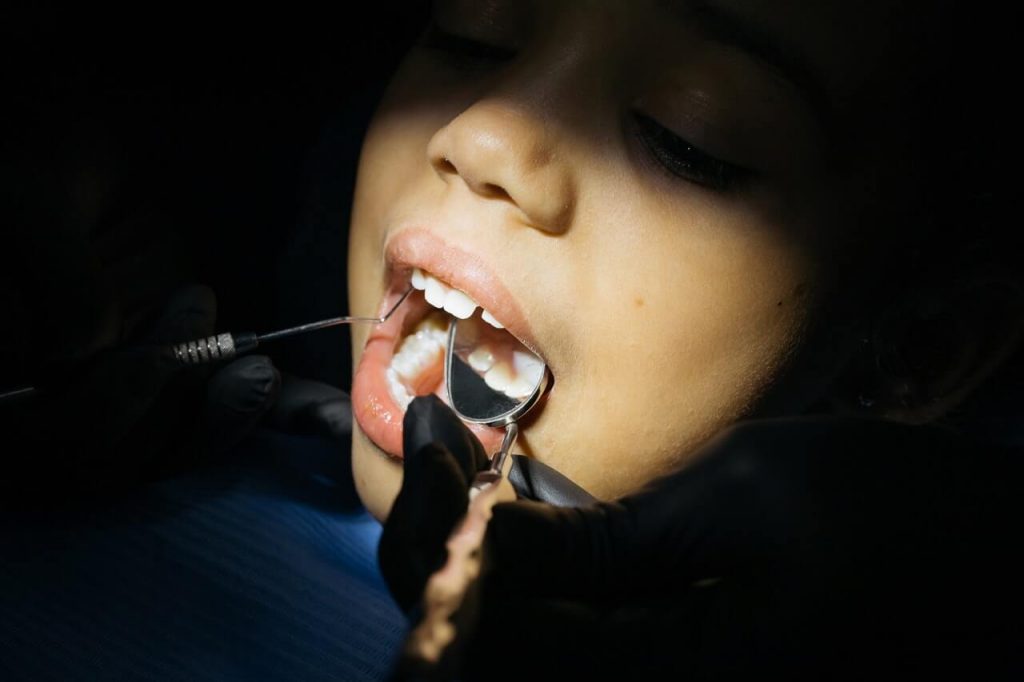Dental diseases in children should be a major cause of worry for any parent. What about low self-esteem your child may suffer from crooked teeth?
Children are no different from adults. The same dental problems that affect adults are the same ones that affect children.
At times you can find them playing silly games like climbing and jumping on the jungle gym. As a result, they end up falling and breaking their teeth.
Some accidents are just inevitable at home and might end up causing cavity problems in your child.
Besides, as they grow, they tend to put anything that comes their way in their mouth, which might cause more severe problems to their teeth.
Also, other pediatric dental problems might affect your child’s teeth while growing and cause poor and misaligned tooth development.
Understanding the causes and treatment of these conditions will help you prevent them before they rob the smile off your child.
Here are the 7 most common dental diseases in children and tips for preventing them from developing.
-
Tooth Decay (Cavities)
Tooth decay can become a significant issue in kids because of their love for sweet and sugary things. The sugar and acid in the food remains tend to wash away the enamel, thus wearing away the tooth.
Also, since they aren’t capable of brushing and flossing without observation, this might add to the already present cavity disease.
Therefore, parents need to supervise their kids and help them brush their teeth until they can do so by themselves.
The possible treatment for this condition is a tooth filling. This consists of drilling away the decay and filling the hole with gutta-percha. Therefore keeping bacteria from entering the teeth, thus, prevent dental diseases in children.
-
Tooth Sensitivity
Just like adults, kids also have sensitive tooth disease. This condition can be painful, uncomfortable, and distracting and often disrupt your child’s concentration, comfort, and routine.
Some common causes of your child’s tooth sensitivity include cavities, enamel wear, a cracked or missing filling. Also, newly erupted permanent teeth, acid erosion, teeth grinding, and orthodontic treatment.
A sensitive tooth is fluoride treatment to strengthen the tooth enamel, dietary changes, and healthier brushing habits. In addition, observing any other dental procedures to prevent the issue from becoming worse.
-
Over-Retained Primary Teeth
When your baby’s primary teeth don’t loosen, it can obstruct the primary tooth underneath from sprouting out. Therefore, causing two teeth to exist in one spot. In such a case, the child might develop deeper oral issues due to the over-retained primary teeth.
Over-retained primary teeth can also cause trauma, misalignment, and infection. This may lead to other severe dental problems if left unattended.
To handle this situation, you can use the braces to correct any misalignment. Alternatively, remove the primary teeth with the help of a dentist.
-
Pediatric Gingivitis and Gum Disease
Pediatric gingivitis and gum disease can also affect children just as it does adults. In fact, it is more conspicuous in pediatric dental patients.
Its signs and symptoms include gum disease marked by red, swollen gums, and minor bleeding when your child flosses or brushes.
To prevent this condition, you need to improve your child’s oral hygiene and ensure that they brush and floss daily.
-
Orthodontic Problems
Orthodontic problems are mostly genetic. The problem is caused by an abnormal or oversized jaw development that later affects how your child’s teeth grow.
The condition might also lead to teeth misalignment, crooked smiles, and overcrowding. Additionally, cracked teeth which will later cause open bite, spacing, underbite, and overbite problems.
However, there are many treatment options available for this condition.
Take your child to the dentist as soon as possible. The best time may be at the age of seven or eight, to correct the problem.
-
Excessive Thumb Sucking
Children often suck their thumbs to pacify or soothe their anxiety.
The chronic thumb is the one that majorly feels the effects, and it causes what is called an open bite. An open bite makes the upper front teeth not aligned to the lower front teeth, leaving a gap even when the mouth is shut.
There is an age and duration that this condition is prevalent, but if it goes beyond, they develop dental problems and can cause issues with how a child’s teeth develop.
The misaligned teeth can cause severe jaw problems that might need surgery to fix if not attended to immediately.
Please ensure that this habit does not go past the toddler stage. Excessive thumb sucking can hinder your child’s speech and even alter how they bite and chew.
-
Teeth Grinding
This habit is found in babies and toddlers, and it’s most prevalent when they are asleep.
They tighten or grind their teeth when their primary teeth start to emerge. This causes pain and discomfort to them.
However, the habit is just for some time. If your child continues grinding their teeth past a certain age, they increase the chances of eroding their tooth enamels, resulting in tooth decay or even a sensitive tooth.
The possible treatment for this condition is to get a custom-made mouthguard to use at night. This will help stop or ease your grinding and offer some protection to your teeth.
Conclusion
Practicing oral health will help maintain healthy cavities and help relieve the abnormal alignment of the upper and lower teeth.
Besides, the maturity of young permanent teeth is of great significance in alleviating periapical lesions, dental caries, dental trauma, pulpal, and abnormality of development and oral habits as seen in children.
These conditions hinder the proper growth of the upper and lower teeth.
This review has highlighted the common dental diseases in children, and it has brought to your understanding the tip to prevent, treat, and manage them.
If you keenly follow these steps, you will be less worried that your child could develop any dental diseases.
These tips might look simple and easy to do, but ignoring them might increase your child’s chances of getting dental problems that can lead to something worse.
Also, endeavor to improve the relationship between you and your dentist by regularly visiting him and having your teeth checked and cleaned regularly as well to avert all the problems mentioned above.


